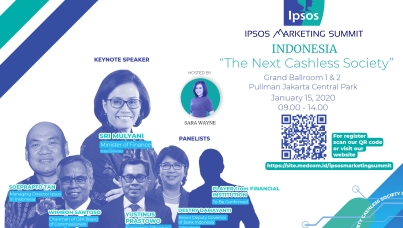Flair Indonesia 2024: Unstoppable?
Last November, Indonesia played host to the Summit in Bali, and the motto of the Indonesian G20 Presidency Recover Together, Recover Stronger appears to have proven quite effective in the polycrises engulfing the world. This has given rise to a new disorder where crises no longer unfold sequentially but rather occur simultaneously and interdependently, encompassing geopolitical, economic, climatic, migratory, social, and identity related challenges, not to mention conflicts and terrorism.
Indonesia seems to be distinguishing itself in this scenario, and it must be immediately acknowledged that consumers, overall, exude much greater confidence and optimism compared to the global average. This creates an advantageous situation for brands and communication efforts. Nevertheless, this doesn’t imply naivety on their part; to the contrary, they are becoming increasingly well-informed and sensitive to notions such as the origin (local Vs. international) of products, the authenticity of the relationship with them, and the environmental impact of their consumption - an issue that has emerged as a crucial concern. A staggering 92% of Indonesians concur with the idea that if we don’t promptly change our habits, we are heading towards an environmental disaster (compared to 80% globally), surpassing respondents from Zambia and Vietnam (91%). Among the numerous alerts, the pollution peaks in Jakarta have made it the most polluted city in the world for several days in early August, reaching levels that required the coal-fired power plant in Suralaya to reduce its electricity production by nearly 50% in September.
It is not surprising that the gap between Asia, particularly ASEAN, and other parts of the world is widening. Some feel that the past was better and that the future will be increasingly frustrating (as exemplified by Europe, especially France), while others believe that the present is better than the past and that future and progress are (finally) synonymous. They see the future as full of promises for themselves, their families, the country in general, and Indonesians embody this perspective perfectly.
This contrast becomes evident when comparing the results of What Worries the World (a survey conducted in 29 countries) regarding the general outlook for countries. In October 2023, 38% of interviewees globally think their country is heading in the right direction, while 77% of Indonesians believe so, after 80% in September, n°2 (Singapore being n°1 with 82% and India n°3 with 76%) The most optimistic countries remain in the AsiaPacific region, though there have been some changes at the top.
On the other hand, several societal indicators need to be monitored, especially in the context of the presidential election: crime and violence, which consistently concerns 25% of the population, poverty and social inequalities (44%, ranking n°1 globally), unemployment (43% in October after 38% in September), and corruption (53%, n°1 as well).
Inequalities are particularly poorly tolerated, as another Ipsos survey, Global Trends shows that Indonesians are primarily seeking balances, whether socio-economic, cultural, or otherwise. 90% believe that Having large differences in income and wealth is bad for society overall (compared to 74% globally).
If these figures were to be distilled into a few words, it could be said that worries are progressively focusing more on purchasing power and job security, along with fundamental societal issues. The sensitivity of the various candidates to these crucial matters could potentially be the gamechanger.
Indeed, there is a risk if the public feels that there are winners and losers of progress, that changes are challenging traditions and values, which explains the tension between the 64% of Indonesians who «would like my country to be the way it used to be» (compared to 60% worldwide and 5 points more than in 2021) and those who are the least likely to say «I wish I could slow down the pace of my life, 44% vs. 73% worldwide. Idealizing the past, preferring the local, the small, and the close, etc., all represent antidotes to a globalization often perceived as rootless, disembodied, abstract, and anonymous.
In addition to politicians, the role of brands and companies is decisive: in a context of uncertainties, brands must, therefore, express their worldview, show how they are aligned with the people’s concerns and hopes, and how they can contribute to improving society by being in tune with three decisive trends: shaping expectations, considering the context, and acting with empathy.
Discover how in this new edition of Ipsos Flair, Indonesia 2024, Unstoppable? The momentum that has been in place for several years works as a booster and reinforces the idea that Indonesia is capable of achieving its goals, unless there is a turnaround after the elections.
Concrete applications in terms of communication, marketing, CSR engagement, etc., are waiting for you.
Enjoy the reading!

![[Webinar] One Mind Many Truths: An Ipsos APAC Webinar on Generations](/sites/default/files/styles/list_item_image/public/ct/event/2023-10/MicrosoftTeams-image%20%2810%29_0.png?itok=z8oqhKPD)

